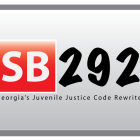
Georgia Appeals Court Rejects Check-Box Juvenile Court Order
|
An order by a Juvenile Court judge on a pre-printed form made by checking boxes and writing cursory comments, was thrown out by the Georgia Court of Appeals. The judge admits he got sloppy on the form, but stands by the merits of his decision and explains that the case was complicated by Georgia sentencing guidelines. JXB, a minor from central Georgia, was sentenced to a year in secure state detention for bringing a weapon to school, as specified in an order earlier this year from Ocmulgee Judicial Circuit Juvenile Court Judge Philip Spivey. But the order itself was a pre-printed form that offered check-box options to serve as findings, such as: offender “has demonstrated by his conduct a lack of respect for authority, both parental and legal.”
The form also includes boilerplate language on the five categories that Georgia law requires juvenile sentencing judges to consider, such as needs and best interests of the child and protection of the community. Underneath, there is space for the court to record the facts in each category, said Carl Cansino, JXB’s attorney.






